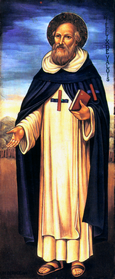Lives of the Saints
Our Models and Protectors
Spiritual Bouquet:
November 20

Saint Felix of Valois
Co-Founder
(1127-1212)
Saint Felix was the son of the Count of Valois. His mother carried him to Saint Bernard at his monastery of Clairvaux, to offer him there to God, when he was three years old; she kept him, however, under her own care and took particular care of him, permitting him, still young, to distribute the alms she was pleased to give to the poor. When the exiled Pope Innocent II sought refuge in France, the Count of Valois, father of Felix, offered his castle of Crepy to the Pontiff, who often blessed the young child whom he saw being trained in virtue. One day when Felix gave away his own habits to a poor beggar, he found them that evening neatly laid on his bed; and he thanked God for this sign of His divine goodness, proving that one loses nothing when one gives to the poor.
When he was ten years old he obtained grace for a prisoner condemned to death, by means of his prayer and his pleadings with his uncle, a lord of whom the man was the subject. Felix had a presentiment that this man would become a saint; and in fact, he retired into a deep solitude where he undertook severe penance and died the death of the just.
The unfortunate divorce of the parents of Felix, and the excommunication of his father, who had remarried and whose condemnation raised serious troubles on his domains, caused to mature in the young man a long-formed resolution to leave the world. Confiding his mother to her pious brother, Thibault, Count of Champagne, Felix took the Cistercian habit at Clairvaux. His rare virtues drew on him an admiration such that, with Saint Bernard's consent, he fled from it to Italy, where he began to live an austere life with an aged hermit in the Alps. For this purpose he had departed secretly, and the servants his uncle sent believed him dead, being unable to trace him; they published the rumor of his death. About this time the old hermit procured the ordination of his disciple as a priest.
After his elderly counselor died in his arms, Saint Felix returned to France. He built a cell in the diocese of Meaux in an uninhabited forest; this place was later named Cerfroid. Amid savage beasts he led an angelic life of perpetual fasting. Here God inspired him with the desire of founding an Order for the redemption of Christian captives. The Lord also moved Saint John of Matha, a young nobleman of Provence, to seek out the hermit and join him. The two applied themselves to the practice of all virtues. It was John who overtly proposed to Saint Felix the project of an Order for the redemption of captives, when his preceptor was already seventy years old. The latter gladly offered himself to God for that purpose, and after praying for three days the two solitaries made a pilgrimage to Rome in the middle of winter. They were kindly received by the Pope, after he read the recommendation which the Bishop of Paris had given them. He too prayed and became convinced that the two Saints were inspired by the Holy Spirit, and he gave his approbation to the Trinitarian Order
Within forty years the Order would have six hundred monasteries. Saint John, who was Superior General, left to Saint Felix the direction of the convents in France, exercised from the monastery which the founders had built at Cerfroid. There Saint Felix died in November of 1212, at the age of eighty-five, only about six weeks before his younger co-founder. It is a constant tradition in the Trinitarian Order that Saint Felix and Saint John were canonized by Urban IV in 1260, though no bull has ever been found. In 1219 already the feast of Saint Felix was kept in the entire diocese of Meaux. In 1666 Alexander VI declared that veneration of the servant of God was immemorial.
The Lives of the Fathers, Martyrs and Principal Saints, by Rev. Alban Butler (Metropolitan Press: Baltimore, 1845), Vol. IV, October-December; Les Petits Bollandistes: Vies des Saints, by Msgr. Paul Guérin (Bloud et Barral: Paris, 1882), Vol. 13